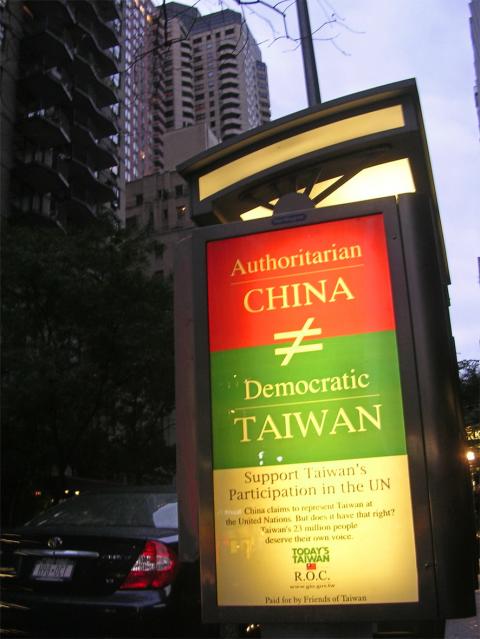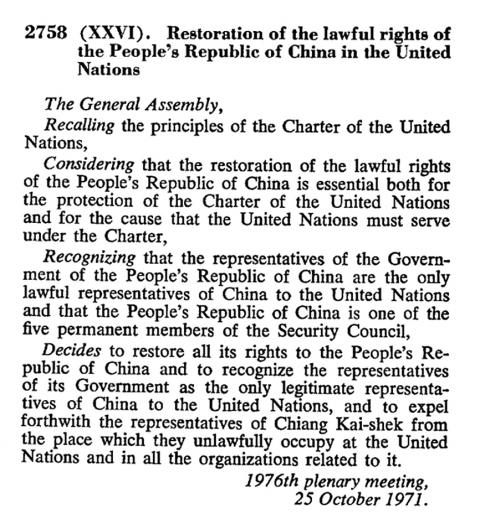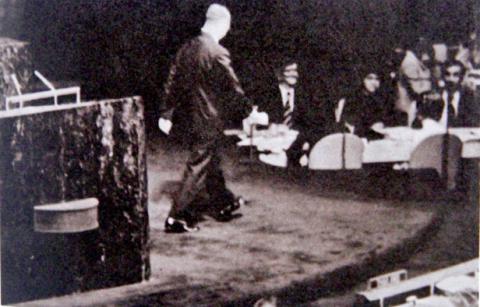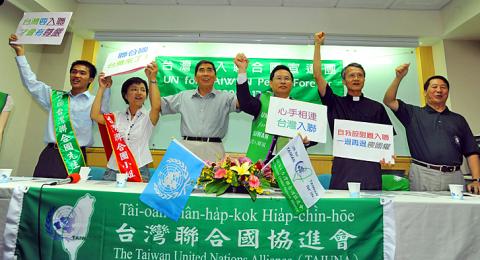Taiwan in Time: Oct.19 to Oct. 25
Taiwan is one of a handful countries in the world not a member of the UN, stemming back to Oct. 25, 1971 when UN General Assembly Resolution 2758 was ratified in a two-thirds vote.
The resolution, sponsored by Albania, recognized the People’s Republic of China (PRC) as “the only legitimate representative of China to the United Nations” and expelled “the representatives of Chiang Kai-shek [蔣介石] from the place which they unlawfully occupy at the United Nations and in all the organizations related to it.”

Photo: Wang Pei
The issue was that after the Chinese Civil War, the PRC under the Chinese Communist Party gained control of China, with Chiang’s Republic of China (ROC) government under the Chinese Nationalist Party (KMT) relegated to Taiwan and other minor islands. Yet both governments continued to claim to be the legitimate ruler of both China and Taiwan.
In fact, the ROC was a charter member of the UN, formed also this week, on Oct. 24, 1945, along with the Soviet Union, the UK and the US.
The UN General Assembly debated transferring China’s seat from the ROC to the PRC throughout the 1950s and 1960s, but the US was able to use its influence to block the move.

Photo courtesy of Wikimedia Commons
As early as 1950, the UK recognized the PRC as the legitimate government of China, severing relations with the ROC. But things really started changing in the 1960s, as the PRC gained the support of a large number of newly independent nations (mostly in Asia, South America and Africa) that changed the composition of the international body. And in 1964, even France, decided to recognize the PRC.
Starting in 1961, the US and other countries would introduce a resolution every year deeming any proposal to change China’s representation an “important question” that required a two-thirds majority to pass. That resolution would pass every time, but the vote for the subsequent resolution regarding accepting the PRC became increasingly tighter, reaching a tie in 1965.
Canada established ties with the PRC in October 1970. A month later, for the first time a majority supported the PRC’s admission with a 51 to 49 vote — although still not meeting the two-thirds requirement.

Photo taken from the book ‘The KMT and The ROC’
The US had tried to propose the idea of dual representation by allowing both governments into the UN (with the PRC taking over the Security Council seat) but neither Chiang nor the PRC would likely have agreed to such an idea due to their insistence on being the sole ruler of China and Taiwan.
The US submitted a dual representation resolution in 1971 nonetheless. Albania, however, had already submitted its bid to admit the PRC and it was to be voted on first. If passed, then dual representation would be a moot point. The Americans made one last effort by proposing to remove the “expulsion of Chiang” part from Albania’s resolution, but the motion was rejected.
Before the vote, the ROC delegation announced that they would not take part in further proceedings and walked out of the General Assembly.

Photo: Wang Yi-sung, Taipei Times
On Oct. 27, Chiang officially declared the ROC’s withdrawal from the UN and its refusal to recognize the resolution.
“The United Nations has set justice aside, shamefully prostrating to evil forces and cowardly yielding to violence,” he wrote. “The United Nations that my country helped form is now a hotbed of evil, and history will prove that the Republic of China’s declaration of withdrawal will also be the declaration of the destruction of the United Nations.”
“My compatriots, the fate of our country is not in the hands of the United Nations, but in our own,” he added.
The resolution never directly mentioned the ROC or Taiwan, but the country’s bid for membership starting in the 1990s under variations of “Republic of China, Taiwan” and in 2007 as “Taiwan.”
It has continuously been rejected largely because of China’s opposition and claim that Taiwan is part of its territory and not a sovereign country.
In 2008, President Ma Ying-jeou (馬英九) stopped applying as part of his “diplomatic truce” policy toward China, but Taiwanese-Americans continue to protest outside the UN Headquarters in New York each year.
Taiwan in Time, a column about Taiwan’s history that is published every Sunday, spotlights important or interesting events around the nation that have anniversaries this week.

In the March 9 edition of the Taipei Times a piece by Ninon Godefroy ran with the headine “The quiet, gentle rhythm of Taiwan.” It started with the line “Taiwan is a small, humble place. There is no Eiffel Tower, no pyramids — no singular attraction that draws the world’s attention.” I laughed out loud at that. This was out of no disrespect for the author or the piece, which made some interesting analogies and good points about how both Din Tai Fung’s and Taiwan Semiconductor Manufacturing Co’s (TSMC, 台積電) meticulous attention to detail and quality are not quite up to

April 21 to April 27 Hsieh Er’s (謝娥) political fortunes were rising fast after she got out of jail and joined the Chinese Nationalist Party (KMT) in December 1945. Not only did she hold key positions in various committees, she was elected the only woman on the Taipei City Council and headed to Nanjing in 1946 as the sole Taiwanese female representative to the National Constituent Assembly. With the support of first lady Soong May-ling (宋美齡), she started the Taipei Women’s Association and Taiwan Provincial Women’s Association, where she

Chinese Nationalist Party (KMT) Chairman Eric Chu (朱立倫) hatched a bold plan to charge forward and seize the initiative when he held a protest in front of the Taipei City Prosecutors’ Office. Though risky, because illegal, its success would help tackle at least six problems facing both himself and the KMT. What he did not see coming was Taipei Mayor Chiang Wan-an (將萬安) tripping him up out of the gate. In spite of Chu being the most consequential and successful KMT chairman since the early 2010s — arguably saving the party from financial ruin and restoring its electoral viability —

It is one of the more remarkable facts of Taiwan history that it was never occupied or claimed by any of the numerous kingdoms of southern China — Han or otherwise — that lay just across the water from it. None of their brilliant ministers ever discovered that Taiwan was a “core interest” of the state whose annexation was “inevitable.” As Paul Kua notes in an excellent monograph laying out how the Portuguese gave Taiwan the name “Formosa,” the first Europeans to express an interest in occupying Taiwan were the Spanish. Tonio Andrade in his seminal work, How Taiwan Became Chinese,